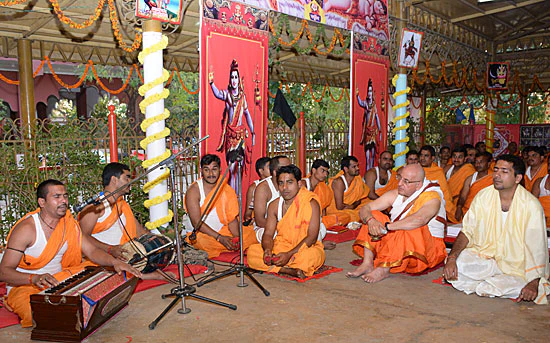Sunil Kumar D.
Devotional singing of Bhajans is the method of singing that originates in the heart and comes out of our tongue. It is the expression of our joyous thrill while singing the Glory of God. It is the spontaneous manifestation of inner happiness. It does not seek the admiration or the appreciation of the listeners. It is just a group singing of the names of the Lord.
Devotional singing of Bhajan is one of the processes by which you can train the mind to realize eternal values. It teaches your mind to comprehend the glory and majesty of God and stay away from petty horizons of pleasure. Devotional singing induces in you a desire for experiencing the truth, the glimpses of beauty that is God, and the taste of the bliss that is total godliness. It encourages man to dive into himself and be genuinely his real self and not influenced by the external forces.
Devotional singing of Bhajan is a spiritual practice/Sadhana. Every song sung in praise of the
Lord/God/Goddess is a sword that cuts the six enemies of the mind, which are Kama (desire/lust), Krodha (anger), Lobha (greed), Mada (ego), Moha (attachment) and Matsarya (jealousy) additionally, Alasya (laziness). It is a great social service to remind all of their duty to the Almighty, who watches over them.
People realize that there is nothing superior to Bhajans for they are filled with bliss. They demonstrate oneness when groups of people join in voicing the names of God. The vibrations emanating from singing Bhajans make the heart vibrant. If you sing alone in the shrine, the vibrations return to you as a reaction but in community singing, you do not have a reaction but a wave of vibrations. They enter into the atmosphere and purify the polluted air as today’s atmosphere around us is polluted by bad thoughts and feelings. When you sing the Glory of God, the bad thoughts will be destroyed and thereby the bad actions will be vanished.
When all the participants in a Bhajans singing are in unison, sacred vibrations are produced and divine energies are released. When the cosmos is filled with these vibrations, they inspire divine power to destroy bad forces and establishes equilibrium in the world. Those who sing Bhajans derive joy and distribute joy. It is recommended to have Bhajans on as many days as possible or at least once a week. Have them in a central hall where all the devotees can sit comfortably and sing. Bhajans can be sung in any language as long as all can follow them but all in chorus can sing familiar Bhajans and bring added Ananda/bliss. When you sing Bhajans, try to understand the meaning of the song and the message of each name and form of God. Bhajan must provide a thrilling experience to the participants and leave them with full of pure energy and elevated enthusiasm.
The purpose of singing Bhajan is to spread good will, love, and happiness. It must cleanse the polluted atmosphere; it must invite all to share the joy and peace. The Ngarsankirtan/ congregational singing of Bhajans must be radiating devotion and love. The singer should fill every moment of singing with energy, enthusiasm, and effort to derive the Ananda/bliss to the participants. Everyone must sing the names aloud as far as the voice can reach so that the divine will respond in full measure and shower His grace.
Together with melody and rhythm, you have to impart feeling to your singing to make the Bhajan a sacred offering to the Divine. A tune without feeling is ineffective. You must sing the Bhajans in a spirit of humility and devotion. Bhajan must make the listener to experience the presence of the Lord and your singing should please the Lord as well. Devotional fervor is more important than musical skills in singing Bhajans. Pay just attention to the tune, the raga (rhythm), the tala (beat), the pronunciation, the meaning, and other fine points of the Bhajans.
While singing, let your heart pant for God, then the raga (rhythm) and tala (beat) will automatically be pleasant and correct. Do not sing one song for more than six minutes, repeating the same line often. Repeat each line twice and no more. Have only two speeds, slow and fast. In this way, you can have in one hour of Bhajans, more songs, more forms, more tunes, and more variety, giving more people a chance.
Those with a good voice and musical talent must lead the Keertan/singing the name of God. It must be pleasant to the ear. If your voice is not pleasant or sweet, keep quiet or sing in your mind that is the best service you can do. Participants should carry the elevated, uplifted and sublime mood created by the atmosphere at the Bhajans. Therefore, after the Bhajans, people should disperse quietly; maintaining silence so that the joy and peace derived from the Bhajans will linger and abide in the heart.
Also Read: Kirtan: The Medicine for the Mind and Soul







